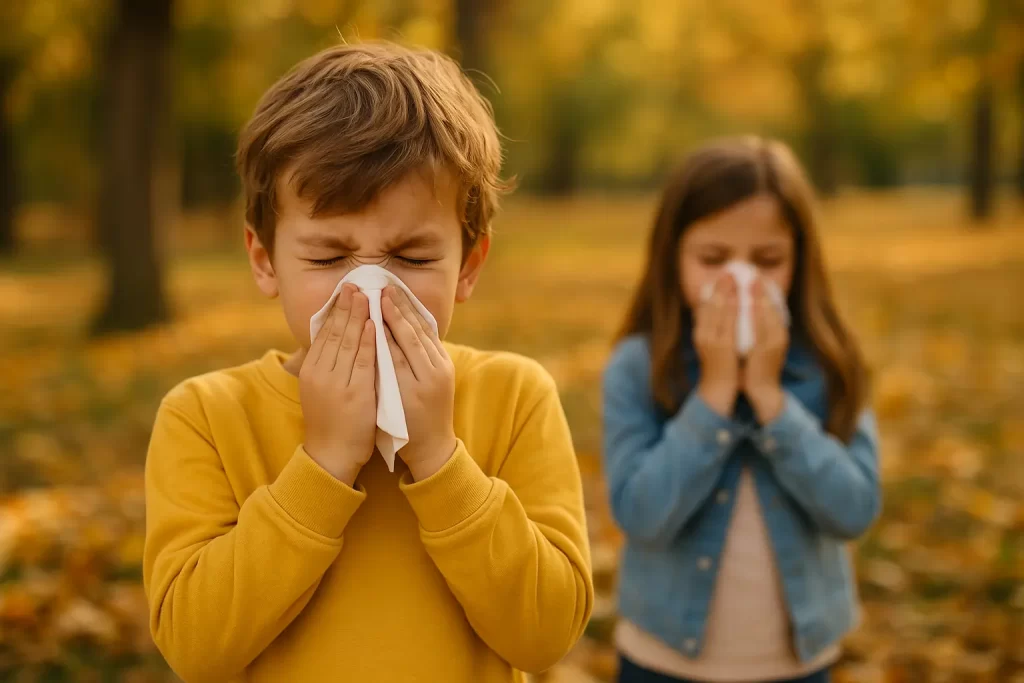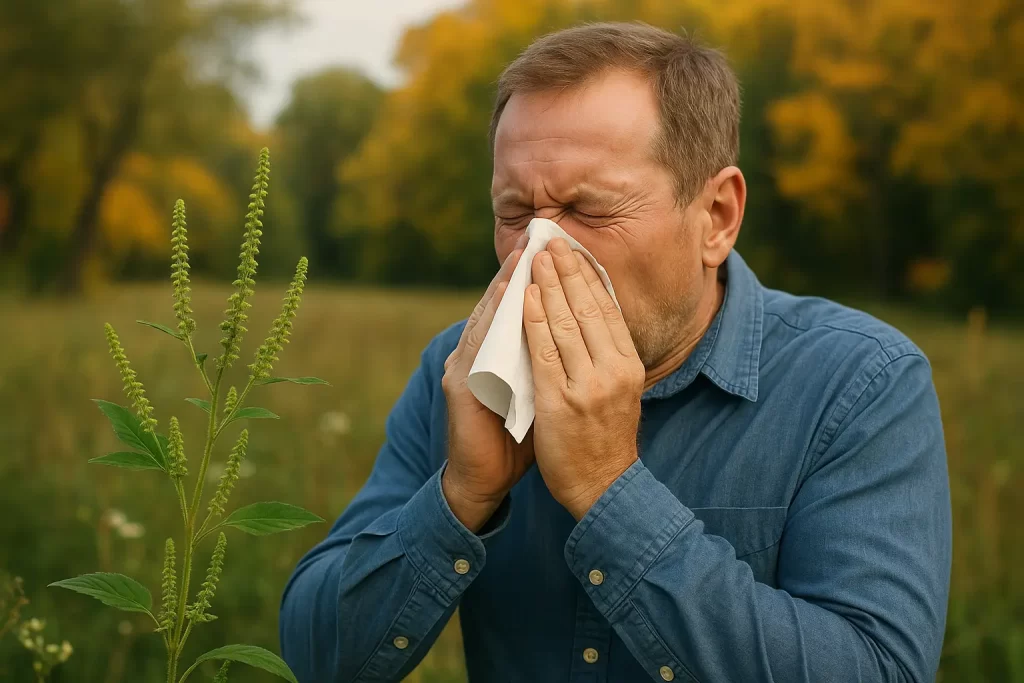As the summer heat begins to fade and autumn arrives in the Wiregrass area, many Dothan residents breathe a sigh of relief—until fall allergies strike. If you’ve noticed increased sneezing, itchy eyes, or congestion as the seasons change, you’re not alone. Southeast Alabama’s unique climate and vegetation create the perfect storm for fall allergens that can make life miserable for allergy sufferers throughout Houston County and the surrounding Wiregrass communities.

At our Dothan ENT practice, we see a significant increase in allergy-related visits each fall. Understanding what triggers your symptoms is the first step toward finding relief. Here are the top five fall allergies affecting residents throughout the Wiregrass region.
1. Ragweed: Southeast Alabama’s Most Notorious Fall Allergen
Ragweed is the undisputed champion of fall allergies in the Dothan area and throughout southeast Alabama. This resilient plant thrives in our warm, humid climate and begins releasing pollen in late August, with peak levels typically occurring in mid-September through October.
A single ragweed plant can produce up to one billion pollen grains, and these lightweight particles can travel hundreds of miles on the wind. Throughout the Wiregrass region—from Dothan to Enterprise, Ozark to Eufaula—ragweed pollen counts soar during fall months, affecting up to 75% of people who suffer from seasonal allergies.
Symptoms of ragweed allergy include sneezing, runny or stuffy nose, itchy eyes and throat, and sinus pressure. Many Wiregrass residents who’ve never experienced allergies before may suddenly develop ragweed sensitivity as adults.
2. Peanut Dust: The Wiregrass Region’s Agricultural Allergen
Southeast Alabama is one of the nation’s leading peanut-producing regions, and the Wiregrass area is at the heart of this agricultural tradition. During harvest season—typically running from late September through November—peanut dust becomes a significant allergen for residents throughout Houston, Dale, Henry, and surrounding counties.
When peanuts are harvested, dried, and processed across the thousands of acres of farmland in the Dothan area, fine particles of peanut dust become airborne and can travel for miles. This dust contains peanut proteins, soil particles, and other plant materials that can trigger allergic reactions even in people without peanut allergies.
Farm workers, those living near agricultural operations, and residents in rural areas of the Wiregrass region are particularly affected. However, even Dothan residents in more urban settings may experience symptoms when wind carries peanut dust from nearby farms. Symptoms include respiratory irritation, coughing, sneezing, itchy or watery eyes, throat irritation, and in some cases, difficulty breathing. For individuals with asthma or existing peanut sensitivities, exposure to peanut dust during harvest season can be especially problematic and may require increased medication or medical intervention.
3. Bahia Grass Pollen: A Wiregrass Region Staple
Bahia grass is extremely common throughout southeast Alabama, prized for its drought tolerance and ability to thrive in our sandy soil. However, for allergy sufferers in Dothan and surrounding communities, Bahia grass becomes problematic in late summer and early fall when it releases significant amounts of pollen.
Unlike spring grass allergies, Bahia grass pollen season extends well into October in the Wiregrass region. This grass is particularly prevalent in pastures, along roadsides throughout Houston County, and in many residential lawns across Dothan.
Symptoms include the typical allergy triad of sneezing, runny nose, and itchy eyes, along with potential skin reactions for those who come into direct contact with the grass.
4. Pigweed and Other Amaranth Family Plants
Pigweed, also known as Palmer amaranth, is abundant throughout agricultural areas in southeast Alabama. This hardy plant thrives in the Wiregrass region’s farmland and releases pollen from late summer through the first frost, which in our area typically doesn’t occur until November or even December.
For residents living in rural areas surrounding Dothan, or those who work in agriculture throughout Houston, Dale, and Henry counties, pigweed exposure is nearly unavoidable during fall months. The pollen from these plants is highly allergenic and can travel considerable distances on the wind, affecting even urban areas of Dothan.
5. Cocklebur and Other Native Weeds
These plants thrive in disturbed soil and can be found along highways throughout the area, in construction sites across Dothan’s growing communities, and in agricultural fields throughout southeast Alabama. Their pollen contributes to the overall allergen load that makes fall particularly challenging for sensitive individuals.
Finding Relief: When to See an ENT Specialist in Dothan
Southeast Alabama’s roadsides and vacant lots are home to numerous native weeds that contribute to fall allergy misery. Cocklebur, marsh elder, and dog fennel are particularly common throughout the Wiregrass region and produce significant pollen during autumn months.

While over-the-counter antihistamines can provide temporary relief, persistent or severe allergy symptoms warrant professional evaluation. If your fall allergies are interfering with your daily life, affecting your sleep, or causing recurrent sinus infections, it’s time to consult with an ear, nose, and throat specialist.
Our Dothan practice serves patients throughout the Wiregrass region, offering comprehensive allergy testing to identify your specific triggers and developing personalized treatment plans. Options may include prescription medications, immunotherapy, or lifestyle modifications tailored to southeast Alabama’s unique allergen profile.
Practical Tips for Managing Fall Allergies in the Wiregrass Area
- Monitor local pollen counts through Dothan weather reports and allergy tracking apps
- Keep windows closed during peak pollen hours (typically early morning)
- Use HVAC filters rated MERV 11 or higher to trap allergens in your home
- Shower and change clothes after spending time outdoors
- Avoid yard work during high pollen days, or wear an N95 mask when raking leaves
- Keep your vehicle windows closed while driving through rural areas of southeast Alabama
- Run a dehumidifier to keep indoor humidity below 50% and prevent mold growth
Your Wiregrass ENT Partner
Fall doesn’t have to be a season of suffering. Understanding which allergens affect you and taking proactive steps can dramatically improve your quality of life during Alabama’s beautiful autumn months. If you’re struggling with persistent allergy symptoms in Dothan or anywhere in the Wiregrass region, our experienced ENT team is here to help you breathe easier.
Contact our Dothan office today to schedule an allergy evaluation and discover personalized solutions for your fall allergy challenges. Serving Houston County and the greater Wiregrass area with comprehensive ear, nose, and throat care.
